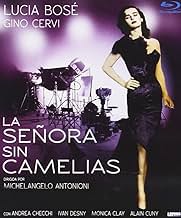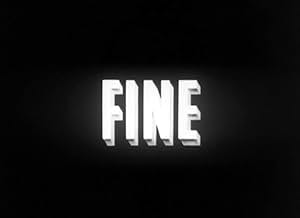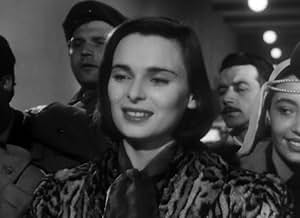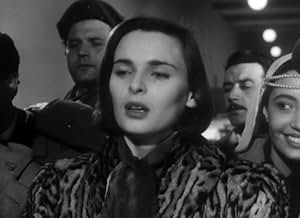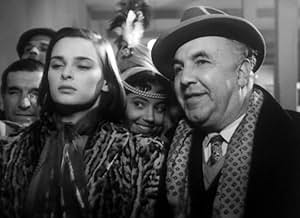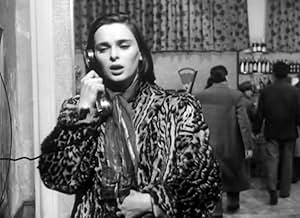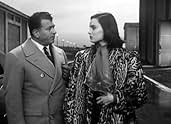VALUTAZIONE IMDb
7,1/10
2429
LA TUA VALUTAZIONE
Gli alti e bassi della vita cinematografica per una nuova star.Gli alti e bassi della vita cinematografica per una nuova star.Gli alti e bassi della vita cinematografica per una nuova star.
- Regia
- Sceneggiatura
- Star
- Premi
- 1 vittoria in totale
Antonio Acqua
- Movie Theatre Owner
- (non citato nei titoli originali)
Emma Druetti
- Simonetta Rota's Mother
- (non citato nei titoli originali)
Rita Giannuzzi
- Simonetta Rota's Friend
- (non citato nei titoli originali)
Vittorio Manfrino
- Clara Manni's Father
- (non citato nei titoli originali)
Recensioni in evidenza
About sex and cinema 'The Lady Without Camelias' reaches new heights in technical quality and sexiness, for Antonioni, whilst thoroughly dismantling the superficiality of cinema.
"La Signora senza Camelie" is arguably Antonioni's first masterpiece. It's about a shop-girl 'discovered' by an ambitious producer who doesn't just want to make her a star but his wife as well and who then proceeds to make her miserable. It's not a great film about the cinema but then that's hardly the point; rather you can see in it the seeds of his later films about unhappy women and mentally abusive men.
As the unfortunate Clara, rich and bored like so many Antonioni heroines, the little known Lucia Bose is excellent and visually it is often extraordinary. It doesn't quite fit into the broader and deeper contextualization of the trilogy that began with "L'Avventura" but in its treatment of its heroine it is unmistakably the work of its director and it's a much more intellectually rigorous picture than anything his contemporaries was doing at the time, For anyone remotely interested in following the trajectory of Antonioni's career this is essential viewing.
As the unfortunate Clara, rich and bored like so many Antonioni heroines, the little known Lucia Bose is excellent and visually it is often extraordinary. It doesn't quite fit into the broader and deeper contextualization of the trilogy that began with "L'Avventura" but in its treatment of its heroine it is unmistakably the work of its director and it's a much more intellectually rigorous picture than anything his contemporaries was doing at the time, For anyone remotely interested in following the trajectory of Antonioni's career this is essential viewing.
10andrabem
Clara Manni (Lucia Bosé), a shop clerk, came to Rome in order to become an actress. She was discovered by Gianni (Andrea Checchi), a film producer. Now it seems that she's hit the big time. The film she's making now is bound to be a success. She's a star on the rise. Gianni, the producer, is in love with her, and rushes Clara into marriage with the complicity of her parents. She's not really in love with him but marries him all the same. Marriage at the time was a kind of moral (if not financial) safety certificate. This, by the time (1953), was almost mandatory for women.
The marriage is not successful and new roads, provided by chance, offer themselves to her. Clara is a sensitive woman, capable of deep emotions - she gives all of herself in whatever she does. But appearances seem to be more important than feelings in this world. In the end of the film, the tears she sheds while she's smiling, represent her surrender.
Lucia Bosé is superb in her role. Clara's need for love, her hesitations and hopes, are subtly shown - her acting is at the same time minimalistic and full of passion. More than the world of cinema, Antonioni portrays the world in which women had to live at that time. His look is deep and compassionate.
See a very beautiful and sad film about a "lady without camelias" - she lived, loved, suffered, and learned - in the end the flowers were gone and nothing remained but a smile among tears.
The marriage is not successful and new roads, provided by chance, offer themselves to her. Clara is a sensitive woman, capable of deep emotions - she gives all of herself in whatever she does. But appearances seem to be more important than feelings in this world. In the end of the film, the tears she sheds while she's smiling, represent her surrender.
Lucia Bosé is superb in her role. Clara's need for love, her hesitations and hopes, are subtly shown - her acting is at the same time minimalistic and full of passion. More than the world of cinema, Antonioni portrays the world in which women had to live at that time. His look is deep and compassionate.
See a very beautiful and sad film about a "lady without camelias" - she lived, loved, suffered, and learned - in the end the flowers were gone and nothing remained but a smile among tears.
While this is the third feature film of Michelangelo Antonioni, it would mark the second time that Lucia Bose had starred in his film, the first being Antonioni's debut feature Story of a Love Affair. As Lorenzo Cordelli pointed out, Antonioni's The Vanquished had made its debut at the Venice International Film Festival, and in this movie, it contains scenes from the Festival, thereby giving it a somewhat documentary feel as it serves as a backdrop. It tells the story of a fictional star, charting the meteoric rise and fall of her career, and made quite a statement on the Italian film industry of the time, which was producing more than 300 features annually.
Again, the female of the species turn out to be quite strong in character, while the male counterparts continue the trend of being rather meek, and lacking some alpha-male qualities befitting of a leading character status. Here, we have Lucia Bose's Clara Manni, a shopgirl from Milan who was talent spotted and brought to prominence on celluloid by film producer Dr Gianni Franchi, who together with the film world, fell in love with the dazzling beauty (Bose herself was crowed Miss Italia once before). In today's context, this would be akin to continued casting calls for any scream queen/sex siren/teenage starlet to be typecast in a role in their respective blockbusters, with nary an opportunity for them to venture out of the tried and tested, all in the name of profit.
Being rushed into marriage in the middle of a film production, we see how Gianni turns into a green-eyed monster, possessive of his trophy wife and chiding her for wanting to go along with the norm in getting herself casted in roles that require the revelation of some flesh, be it in steamy love scenes or in seductive poses in glossy magazine spreads. Granted, his idea of marriage is to have her become a homemaker given his wealth to provide her a more than comfortable life, but to Clara, it's akin to being imprisoned. So one will come to expect the usual marital woes that befall couples as fools who rush in, and find themselves smashing head on toward a rocky time.
In today's blockbuster world, I guess it's obvious that sex and violence sells. In those days, as explained by the producer character Ercole (Gino Cervi), sex, religion and politics in movies put bums on seats, which accounts for why scantily clad women could have been considered a de-facto "must-have" in order to appeal to the lowest denominator amongst audiences. To Gianni, in his good intent to want to elevate his wife's status to drama-mama, decided to make an art-house Joan of Arc (which we are spared the torture of watching, only provided glimpses of it), much against the common grain of film-making, and with Clara being bored to tears, decided to go along with the project.
With her Joan of Arc being both a critical and commercial failure, Clara becomes vulnerable. But here's where her character got interesting. Like Eve, she's fully aware of the forbidden apple, but yet found herself weak to resist the advances from a fan. She conscientiously knows of the destructive path she'll be walking down, both in reputation and personal life should she embark on an affair, but I guess the appeal that Mr Nardo (Ivan Desny) had, was being the wedge at the right point in time when she was emotionally at her weakest. Again, Nardo is a slimy male character that one would love to hate, given his motive of personal satisfaction in having to conquer a famous actress. However, you must salute his thick- skinned persistence and his great pretension, well hidden behind a suave demeanour.
The saddest character here remains Gianni Franchi. You'll realize that while he has the best of intentions for his wife, life would have it that her reaction to his concern would go unappreciated most of the time. And pride would come in the way when someone who had broken your heart once, come knocking on your door for an opportunity. As Clara's character develops, she slowly learns about her naiveness, and becomes more aware of the business side of the industry. Here's where the film becomes a critical mouthpiece of the state of Italian cinema at the time, which led to potential Claras dropping their willingness to star in the film lest they offend industry folks.
It makes comparisons and draws parallels between the exploitation of an actress's good looks, versus grooming them into serious thespians, and through Clara's bold reinvention of herself, one would have thought she would have learnt a valuable lesson to apply, given an about turn with her new found understanding and strength. But as it turns out, there's this invisible glass ceiling in place.
I thought the ending was one of the most powerful ones, and a definite heart-wencher, seen thus far. It has a resignation to Fate, that no matter how hard one tried, the outcome has already been pre-determined by the stars, and try as you might, you just cannot effect any change. The streaming of tears down the eye, while masking it as tears of joy and forcing a smile, probably reflects Clara's greatest acting moment to date, smiling to mask some extreme unhappiness toward her life and career choices, that she became nothing more than a train on a railroad, following the tracks laid out in front of her. The absolute last frame that lingers, is well worth a ticketed admission, for the fact that Clara finally got to act.
Again, the female of the species turn out to be quite strong in character, while the male counterparts continue the trend of being rather meek, and lacking some alpha-male qualities befitting of a leading character status. Here, we have Lucia Bose's Clara Manni, a shopgirl from Milan who was talent spotted and brought to prominence on celluloid by film producer Dr Gianni Franchi, who together with the film world, fell in love with the dazzling beauty (Bose herself was crowed Miss Italia once before). In today's context, this would be akin to continued casting calls for any scream queen/sex siren/teenage starlet to be typecast in a role in their respective blockbusters, with nary an opportunity for them to venture out of the tried and tested, all in the name of profit.
Being rushed into marriage in the middle of a film production, we see how Gianni turns into a green-eyed monster, possessive of his trophy wife and chiding her for wanting to go along with the norm in getting herself casted in roles that require the revelation of some flesh, be it in steamy love scenes or in seductive poses in glossy magazine spreads. Granted, his idea of marriage is to have her become a homemaker given his wealth to provide her a more than comfortable life, but to Clara, it's akin to being imprisoned. So one will come to expect the usual marital woes that befall couples as fools who rush in, and find themselves smashing head on toward a rocky time.
In today's blockbuster world, I guess it's obvious that sex and violence sells. In those days, as explained by the producer character Ercole (Gino Cervi), sex, religion and politics in movies put bums on seats, which accounts for why scantily clad women could have been considered a de-facto "must-have" in order to appeal to the lowest denominator amongst audiences. To Gianni, in his good intent to want to elevate his wife's status to drama-mama, decided to make an art-house Joan of Arc (which we are spared the torture of watching, only provided glimpses of it), much against the common grain of film-making, and with Clara being bored to tears, decided to go along with the project.
With her Joan of Arc being both a critical and commercial failure, Clara becomes vulnerable. But here's where her character got interesting. Like Eve, she's fully aware of the forbidden apple, but yet found herself weak to resist the advances from a fan. She conscientiously knows of the destructive path she'll be walking down, both in reputation and personal life should she embark on an affair, but I guess the appeal that Mr Nardo (Ivan Desny) had, was being the wedge at the right point in time when she was emotionally at her weakest. Again, Nardo is a slimy male character that one would love to hate, given his motive of personal satisfaction in having to conquer a famous actress. However, you must salute his thick- skinned persistence and his great pretension, well hidden behind a suave demeanour.
The saddest character here remains Gianni Franchi. You'll realize that while he has the best of intentions for his wife, life would have it that her reaction to his concern would go unappreciated most of the time. And pride would come in the way when someone who had broken your heart once, come knocking on your door for an opportunity. As Clara's character develops, she slowly learns about her naiveness, and becomes more aware of the business side of the industry. Here's where the film becomes a critical mouthpiece of the state of Italian cinema at the time, which led to potential Claras dropping their willingness to star in the film lest they offend industry folks.
It makes comparisons and draws parallels between the exploitation of an actress's good looks, versus grooming them into serious thespians, and through Clara's bold reinvention of herself, one would have thought she would have learnt a valuable lesson to apply, given an about turn with her new found understanding and strength. But as it turns out, there's this invisible glass ceiling in place.
I thought the ending was one of the most powerful ones, and a definite heart-wencher, seen thus far. It has a resignation to Fate, that no matter how hard one tried, the outcome has already been pre-determined by the stars, and try as you might, you just cannot effect any change. The streaming of tears down the eye, while masking it as tears of joy and forcing a smile, probably reflects Clara's greatest acting moment to date, smiling to mask some extreme unhappiness toward her life and career choices, that she became nothing more than a train on a railroad, following the tracks laid out in front of her. The absolute last frame that lingers, is well worth a ticketed admission, for the fact that Clara finally got to act.
Personally more appreciate and recognise Michaelangelo Antonioni for his influence in film rather than love him, but still consider him an interesting director and understand completely his appeal. His films are extremely well made and interesting on a thematic level (some like urban alienation being ground-breaking) and his directing style is unique. As has been said more than once though, his style and films are not for all tastes though, for while his films fascinate and transfix many they alienate and perplex others, both sides understandable.
'La Signora Senza Camelie' may not be one of his most best-known or most important films, other films of his may have scenes with slightly more staying power and explore their themes more broadly and deeply. Even though it is an early effort and made when he was still settling his style, 'La Signora Senza Camelie' is unmistakable Antonioni and still is a great film, if not quite extraordinary. Not one of his very best overall, but for me it is among his best of his early films. It is one of his more accessible films, one of the easiest to connect with emotionally for me and it had clearer and more individual character/story development than other films of his. Also he doesn't try to do too much here and he doesn't hammer the points home too hard that it feels heavy-handed.
Visually, 'La Signora Senza Camelie' is very striking. The black and white still looks stunning, the scenery is wonderfully vivid in every frame and the photography often leaves one in awe. A big example being agreed in the rehearsal scene. The music is thankfully the kind that complements rather than clashes and has no trouble fitting with the tone and atmosphere.
The writing didn't come over as rambling to me and instead came over as sincere and thought-provoking. It is in a way a melodrama, but it never really felt too melodramatic or overwrought. Didn't find the storytelling shallow or lacking clarity, the very intriguing themes handled in a way that made impact, both poignant and surprisingly cruel, but not in a way that one feels like they are being preached at. It doesn't come over as incoherent or confused either, or like a disjointed hodge-podge. The characters, particularly the titular character, have dimension and meaning, and much of the storytelling had charm and poignancy, didn't find myself detached here. The ending especially is very moving. The characters thankfully didn't feel like ciphers with some of the strongest female character writing seen in any film by me recently. Again, the male characters aren't as compellingly written but are not too bland.
Antonioni a vast majority of the time drew good and more performances from his casts (with a few exceptions like almost all the cast in 'Beyond the Clouds' and the leads in 'Zabriskie Point'). 'La Signora Senza Camelie' is not an exception, with Lucia Bose giving a quite powerful lead performance and it is a shame that she didn't make it bigger judging from this performance.
On the whole, a great early work by Antonioni and shouldn't be dismissed as a minor one. 9/10
'La Signora Senza Camelie' may not be one of his most best-known or most important films, other films of his may have scenes with slightly more staying power and explore their themes more broadly and deeply. Even though it is an early effort and made when he was still settling his style, 'La Signora Senza Camelie' is unmistakable Antonioni and still is a great film, if not quite extraordinary. Not one of his very best overall, but for me it is among his best of his early films. It is one of his more accessible films, one of the easiest to connect with emotionally for me and it had clearer and more individual character/story development than other films of his. Also he doesn't try to do too much here and he doesn't hammer the points home too hard that it feels heavy-handed.
Visually, 'La Signora Senza Camelie' is very striking. The black and white still looks stunning, the scenery is wonderfully vivid in every frame and the photography often leaves one in awe. A big example being agreed in the rehearsal scene. The music is thankfully the kind that complements rather than clashes and has no trouble fitting with the tone and atmosphere.
The writing didn't come over as rambling to me and instead came over as sincere and thought-provoking. It is in a way a melodrama, but it never really felt too melodramatic or overwrought. Didn't find the storytelling shallow or lacking clarity, the very intriguing themes handled in a way that made impact, both poignant and surprisingly cruel, but not in a way that one feels like they are being preached at. It doesn't come over as incoherent or confused either, or like a disjointed hodge-podge. The characters, particularly the titular character, have dimension and meaning, and much of the storytelling had charm and poignancy, didn't find myself detached here. The ending especially is very moving. The characters thankfully didn't feel like ciphers with some of the strongest female character writing seen in any film by me recently. Again, the male characters aren't as compellingly written but are not too bland.
Antonioni a vast majority of the time drew good and more performances from his casts (with a few exceptions like almost all the cast in 'Beyond the Clouds' and the leads in 'Zabriskie Point'). 'La Signora Senza Camelie' is not an exception, with Lucia Bose giving a quite powerful lead performance and it is a shame that she didn't make it bigger judging from this performance.
On the whole, a great early work by Antonioni and shouldn't be dismissed as a minor one. 9/10
Lo sapevi?
- QuizMichelangelo Antonioni offered the lead to Lucia Bosè after both Gina Lollobrigida and Sophia Loren turned it down.
- Citazioni
Clara Manni: I was thinking of eternal love, all he wanted was an affair with a film star. And he got it.
- ConnessioniFeatured in Michelangelo Antonioni storia di un autore (1965)
I più visti
Accedi per valutare e creare un elenco di titoli salvati per ottenere consigli personalizzati
- How long is The Lady Without Camelias?Powered by Alexa
Dettagli
- Data di uscita
- Paese di origine
- Lingua
- Celebre anche come
- The Lady Without Camelias
- Luoghi delle riprese
- Aziende produttrici
- Vedi altri crediti dell’azienda su IMDbPro
- Tempo di esecuzione
- 1h 41min(101 min)
- Colore
- Mix di suoni
- Proporzioni
- 1.37 : 1
Contribuisci a questa pagina
Suggerisci una modifica o aggiungi i contenuti mancanti

![Guarda Trailer [OV]](https://m.media-amazon.com/images/M/MV5BMmVmZGM2NWQtMWZkNS00ZmI5LWEwMjctOTE2Njc4MjRiYmFlXkEyXkFqcGdeQXRyYW5zY29kZS13b3JrZmxvdw@@._V1_QL75_UX500_CR0)
